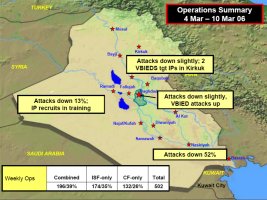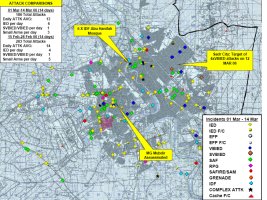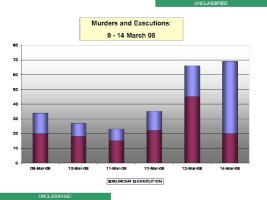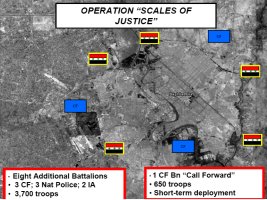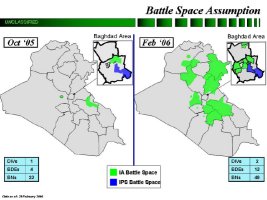
IRAQ OPERATIONAL UPDATE BRIEFING
Multi-National Force-Iraq
IRAQ OPERATIONAL UPDATE BRIEFING BRIEFER:
Maj. Gen. Rick Lynch, spokesman, Multi-National Force - Iraq
Location: Combined Press Information Center, Baghdad, Iraq
Date: Thursday, March 16, 2006
GEN. LYNCH: Appreciate this, especially on this historic day. Probably you were involved in the coverage of the seating of the Council of Representatives. Think about what's happened here. Three years ago, Saddam Hussein was in control of this country. Yesterday he was testifying in his own trial, a trial by Iraqi people in an Iraqi court against Saddam Hussein for his crimes against the Iraqi people. Free from Saddam's tyranny, the Iraqi people have joined together -- two elections, the constitution of last year, and today they seated their constitutionally elected government -- a 275-member Council of Representatives. Clearly, an important milestone on Iraq's pathway to democracy. Absolutely exciting stuff.
First graphic, please.
I want to talk about operations across Iraq, give you the details specifically in the period 4 March to 10 March. And let me walk across Iraq. First, starting in the north, what we're seeing in the northern portion of Iraq, attacks are down slightly. But we're seeing an increase in VBIEDs all across Iraq. And I'll talk to you that in some detail. But we saw two VBIEDs in Kirkuk that specifically targeted Iraqi police -- killed two, wounded four others. But as we studied VBIEDs in Kirkuk since January, there have been eight incidences, seven of which were targeted against Iraqi police. So in accordance with what I've told you in previous press conferences, we're seeing the insurgents targeting the Iraqi security force and Iraqi civilians.
As we study the attacks against Iraqi civilians, over the past four weeks, numbers of attacks against Iraqi civilians have increased 65 percent compared to the previous six months. And the numbers of casualties of Iraqi civilians are, on average, 50 percent of all the casualties across Iraq.
So they're targeting the Iraqi police up in Kirkuk, but I got to tell you, that hasn't slowed down that police. Let me tell you a couple of vignettes.
Just this week, Iraqi police mounted an operation and detained 16 insurgents that were planning attacks against coalition forces in Kirkuk. And again just this week, two Iraqi army soldiers, off-duty, saw a car and two individuals conducting suspicious activities. They went up to the car. They realized that those two individuals were planting IEDs. Even though they were off duty, they took action; they detained those two insurgents. They called for local police. The local police arrested in the insurgents, Iraqi officials detonated the IED. Powerful work by the Iraqi security force up north.
Out west, attacks continue to decrease. They were down 13 percent. And we're averaging in the west now about 15 attacks per day, significantly less than what it was in previous months, which was as high as about 27 attacks per day. And what we're seeing now is the sons of Al Anbar uniting to join the Iraqi security forces. As I've told you before, there's authorization for 11,330 Iraqi police in Al Anbar, but there's only about 3,000 currently on duty. But the sons of Al Anbar are uniting and joining the Iraqi security forces to the point where the Iraqi air force had to be used last week to transport Iraqi police recruits from Al Anbar. Significant progress.
In the southeast, attacks continue to go down. In this reporting period they are down by 52 percent. And in Baghdad itself, attacks were down slightly, but the number of VBIEDs are up significantly. And I'll show you that detail.
Important point. We've now reached the point where about 35 percent of the operations, company and above -- coalition/Iraqi security force operations company and above, are Iraqi security force independent. And if you add the independent Iraqi security force operations to the combined operations, you see about 74 percent are either independent or combined. And we're now at the point where only about 25 percent of operations in Iraq are independent coalition force operations. Either the Iraqi security force is in the lead or they're a combined operation.
Let's talk attack levels during this period of time. There were 533 attacks across Iraq. And as usual, about 27 percent of those were effective attacks, attacks that resulted in the casualty of either an Iraqi civilian, an Iraqi security force member, or a coalition force member, with one significant difference, and that's VBIEDs. During this reporting period we saw across Iraq 30 VBIEDs. The week prior to that there were only 19 -- a 65 percent increase in the numbers of VBIEDs. And I'll walk you through the logic as to why we think that's happening.
Next graphic, please.
Let me zoom in on Baghdad. The people of Iraq are in an extremely vulnerable period while they try to form this national unity government. And today's milestone, the seating of the Council of Representatives, was an important milestone.
But there's still things that need to be done.
If you're the leader of the insurgency, if you're Zarqawi, if you're a terrorist and foreign fighters, you still want to discredit the Iraqi government and derail the democratic process. And today you're mad because the Iraqi people were successful in seating their parliament.
So you're going to continue to say, "What can I do to stop this building of a national unity government? And what you're going to do is try to inflame sectarian violence. And where you're going to do that is in Baghdad, the seat of the government. And that's what we're seeing over the last several weeks. Let me walk you through some details.
If you look in the top left-hand block, you see that during that two-week period, 1 to 14 March, in Baghdad we averaged about 13 attacks, which was less than the two weeks prior to that. But we're seeing about six IEDs or VBIEDs per day. And they're all well-placed and well-timed on the part of the insurgency. Remember, he's trying to inflame sectarian violence.
So the four VBIEDs we saw up in Sadr City on the 12th of March were clearly intended to inflame sectarian violence. And we're seeing that in operations -- insurgent operations across Baghdad. And you can see, when you study your details, that it truly is operations all across Baghdad. So we got to be conscious of that.
We're in a very vulnerable period -- the people of Iraq, the Iraqi security forces, the coalition forces, as they try to form this national unity government, and you got a(n) insurgency that's intent in stopping that from happening. He's frustrated today because the Council of Representatives -- seated. He's going to continue to try to inflame sectarian violence. And he's going to use things like VBIEDs and IEDs to kill innocent civilians. Remember, 65 percent increase in the number of attacks against civilians over the last four weeks, compared to the precious six months. So he's clearly targeting civilians to inflame sectarian violence, and we're seeing that in spades in Baghdad.
Next graphic, please.
He also has another insidious tool in his tool kit, and that's murders and assassinations. As I've told you before, in Baghdad, what we have seen on average is about 10 murders or executions per day. In recent times, we've seen it spike to as much as an average of over 30 civilian murders or assassinations per day, and you can see, on the 13th and the 14th, a significant spike.
We talked last week about a cycle of violence, and that is indeed what the insurgents want to inflame. They want to inflame sectarian violence to the point where Shi'as feel attacked by Sunnis, they retaliate, Sunnis then retaliate against the Shi'a population. And we're seeing that demonstrated in murders and executions, as well as in VBIEDs.
Next graphic, please.
So in collaboration with the Iraqi government and the Iraqi security forces, we have started Operation Scales of Justice. If you believe the enemy is trying to focus on Baghdad, because he's trying to disrupt the formation of this national unity government, then we, the coalition, with the Iraqi security force, the Iraqi government, have to take action. And we have. We've started Operation Scales of Justice, with an intended purpose to create a safe and secure environment on the streets of Baghdad.
Remember, even before this, there were about 26,000 members of the Iraqi security forces in Baghdad and about 10,000 coalition force members. What we've done is started this Operation Scales of Justice and brought, in essence, an increase of 10 percent in the number of security forces -- 3,700 additional troops now patrolling the streets of Baghdad and prepared to conduct offensive operations.
And they came from a variety of sources. Three of the additional battalions were coalition force battalions, three of them were national police battalions, and two of them Iraqi army battalions that were pulled from other operations around Iraq, conditions permitting, and then employed here in Baghdad, with one exception, and that's the call forward force.
We have all along talked about the fact that we have an armored brigade in Kuwait as a call forward force. It was placed down there in case it was needed to provide additional security here in Iraq.
General Casey, in concert with the prime minister, decided that it would be appropriate to call up additional support. So we brought forward a call forward battalion from the call forward force in Kuwait. It was about 650 troops. They're working inside the streets of Baghdad, with joint and combined operations. They're working with the Iraqi security force members. They're doing active patrolling. They're doing offensive operations. And they will stay here as long as necessary. And the period of time that's most vulnerable is this formation of the national unity government. And once we get through that, we believe the insurgent has lost his opportunity to derail the democratic process and discredit the Iraqi government. So this call forward battalion is indeed up from Kuwait. Interesting statistic:
We put it there. It's been training continuously. From the time it was notified for deployment to the time it was established in Baghdad, prepared to conduct operations, was only 48 hours -- 48 hours. And that is by design. So it's up here conducting operations for a short-term deployment that will have long-term impact for the people of Iraq.
And the last graphic, please.
Next Monday marks the third anniversary of the start of Operation Iraqi Freedom, and I want to use this graphic to make a couple of points.
A determination was made in May of 2003 to disband the Iraqi army. In August of 2003 we started training an Iraqi army of about a thousand recruits, and today we've got an Iraqi army of about 127,000 people.
A hundred thousand of them are members of the army itself; 600 are part of the Iraqi air force; 800 are part of the Iraqi navy; and 10,000 are part of Iraqi support troops. So since May of `03 until now, an Iraqi army has been created that is indeed to the point that it's effectiveness, where it controls battlespace, is reflected on this map.
Remember, we talked about this before. When an organization in the Iraqi army achieves a certain level of proficiency, we indeed transition security responsibilities to them, and we've done that now with two Iraqi army divisions, 13 Iraqi army brigades and 49 battalions in the areas that are identified in green on this map. And if you compare that from October `05 until now, you see the significant difference and significant improvement in capability of the Iraqi army. The same with the Iraqi police -- the Iraqi police now is about 127,000 strong, and about 80,000 in the local police, about 40,000 in the national police, and then a Department of Border Enforcement.
In `03, there was only one training academy for the Iraqi police; today there's 12. In `03, there wasn't a Department of Border Enforcement. There weren't Iraqi border guards; today 20,000 strong working out of 258 border forts around Iraq.
So we've seen a marked improvement in the last three years in the capability of the Iraqi security forces, and we've got every reason to believe that the current projections will hold fast; that by this summer, 75 percent of the Iraqi brigades will control battlespace in Iraq and by this fall 80 percent of the Iraqi divisions.
So we're seeing significant progress towards the end state -- an Iraq that's at peace with its neighbors, an ally in the war on terror that has a representative government that respects the human rights of all Iraqis, that has a security force that can maintain domestic order and deny Iraq as a safe haven for terrorists.
I've talked about the Iraqi security force and their remarkable growth and their current capabilities and their projected capabilities. And this idea of forming a representative government is coming across loud and clear in spades today with the seating and the convening of the Council of Representatives.
And with that, I'm happy to answer any questions you might have today. Thank you.
Q General, I'm Jeffrey -- (off mike) --
GEN. LYNCH: Sure. We're just going to need to -- hi, Jeffrey. How are you doing?
Q I'm doing great. I'm with The New York Times. I was here for a good portion of `03-`04 and just got back in the country.
GEN. LYNCH: Welcome back.
Q Thanks. Thanks. Tell me a little bit about these assassinations. What do you think is going on? Some of the government representatives have said they think it's an outside force that's assassinating both Shi'as and Sunnis, but then a lot of people we talked to on the street think it's the Shi'as and Sunnis going after each other with their death squads. What's your take?
GEN. LYNCH: Put the murder graphic back up, please.
Jeffrey, we have been trained over time to think like the enemy: what's his objectives, what's his goals, what's his capabilities. And Zarqawi and the terrorists and foreign fighters have a clear objective: derail the democratic process, discredit the Iraqi government. And he's currently upset because he hasn't been able to do that. He couldn't stop the elections in January. He couldn't stop the elections in December. He couldn't keep them from ratifying the constitution, and he couldn't keep them today from seating the Council of Representatives. So he's most frustrated.
But he knows that a national unity government has not formed, and that's going to take a period of time. The people of Iraq have to come together to form this national unity government. So he's now trying to drive a wedge. He is doing conscious detailed operations to drive a wedge between the Shi'a population, the Sunni population and the Kurdish population here in Iraq. And when he blew up the Golden Mosque on the 22nd of February, that was the reason for that.
And we believe now that these murders are a combination of activity by terrorists and foreign fighters to keep the sparks flamed and also retaliation. It's a cycle of violence. So when Sunnis get killed or murdered, there are Sunnis that in turn take retaliatory action and kill Shi'as. And that's why from the average of 10 murders a day we used to see in Baghdad, we think it spiked to 30 a day.
Q Just a follow-up to that. What can you guys do about that? What can the American military do to help with this problem and increasing the security in Baghdad?
GEN. LYNCH: Two things. One is an increased security force presence. Now, as I told you, 26,000 members of the Iraqi security force right now on the streets of Baghdad, plus an additional 10,000 coalition force members, and we've just plussed that up by 3,700 -- three national police battalions, two Iraqi army battalions and three coalition battalions.
So A way to cause a reduction in these murders and assassinations -- increase security presence, and that's why we -- we're doing what we're doing. We can now surge patrols -- coalition patrols, Iraqi security force patrols. We can position Iraqi security force members and coalition force security members in those areas in Baghdad that we're most concerned about. That's one way.
Another way is to enlist the support of the people of Baghdad to report these acts. Who's committing these murders? Who's committing these assassinations? And we're seeing this ground-swell of support from the people of Baghdad, and the indicator is the use of the national tips line, where they call in specific information that's actual intelligence against people that are committing these acts of violence.
Q Do you have any stats on how many more tips have been received now compared to six months ago or that would kind of back up what you're saying, that more people are using it?
GEN. LYNCH: Yeah, we do, Jeffrey. And we have great details that I've shown in previous press conferences. We'll gather up and get those to you. But it is indeed a marked increase on use of the national tip lines. They're at a point where I think it's 434 a week or so. (To staff) Jeff?
STAFF: The national tips line?
GEN. LYNCH: Yeah, on the national tips line. Anyway, we'll get those numbers to you, Jeffrey. But it's a clear indication.
And the other thing we're seeing, based on an improved capability of the Iraqi security force and an increased presence, is the willingness of the Iraqi population to walk up to the Iraqi security force and say, hey, here's some intelligence you need to know, here's a foreigner we haven't seen, here's a IED-making factory that we think is taking place, here's munitions we think are being stored.
Okay.
Q General, Rod Nordland from Newsweek.
GEN. LYNCH: Hi, Rod.
Q I just wanted to ask a kind of multi-part question, if I can, just about IEDs.
GEN. LYNCH: Sure.
Q When your statistics are showing more civilians being killed --
GEN. LYNCH: (To staff) Put the IED map back up, please.
Q -- is that mainly because civilians are being targeted by the IEDs or is it because civilians tend to get in the way more? I mean, are you counting both incidents that were aimed at coalition but didn't succeed in getting coalition but did get civilians? And --
GEN. LYNCH: I'm going to take these one at a time.
Q Okay, fine.
GEN. LYNCH: And we got plenty of time. Q Yeah.
GEN. LYNCH: We'll get to all these question.
We believe it's a conscious determination on the part of the terrorists and foreign fighters to target civilians with IEDs. We don't think this marked increase in the number of attacks is by accident, but rather he's targeting civilians, because if he targets civilians, he believes he can continue to inflame sectarian violence. So the positioning of these IEDs in mixed areas is clearly intended to cause sectarian violence.
Q And does that mean that IEDs are no longer the main killer of coalition forces, as they were in the past?
GEN. LYNCH: Last week coalition forces were able to find and clear 48 percent of the IEDs that were emplaced. We have indeed reduced our casualties to IEDs. He's still attacking us with IEDs, but he's much, much less effective than he used to be, for three primary reasons. One is we've increased our training of our servicemembers on recognition of IEDs, so our training level's increased. We created a counterinsurgency academy here in Iraq, up in Taji, where our soldiers are trained on recognition of IEDs. So that's one.
The second is the fact that we are killing and capturing the bomb makers. You know, since November we've killed or captured 41 of the bomb makers. These are the guys that had the expertise to build effective IEDs. And with them off the streets, that's not happening.
And the third thing is technological advances to allow us to counter IEDs. So the insurgency is still using IEDs against coalition forces, but with much less effect. And we've reached the point we're almost finding and clearing as many as we're not; 48 percent just last week.
Q And then just in line with that, is this a technology that's being shared with the Iraqi police and military? And also, is there any effort on their part to make their citizens as aware of IEDs and what to look out for as soldiers have become?
GEN. LYNCH: There is a marked effort to cross-level the training and operations against bomb makers and sharing technology with the Iraqi security forces to give them the capabilities that we have. We're in this together. And there is indeed an effort on the part of the Iraqi government to inform the Iraqi people about what to look or for IEDs.
(Pause.) Any other questions? Jeffrey. Isn't it great that there's only two of you? Q Well, I was just about -- that actually was going to be my question. Why do you think there aren't more people here? I was talking to Rod and telling him when I was here before, there was a lot of Iraqi press; you know, as many Iraqi journalists as foreign journalists. Where did everybody go?
GEN. LYNCH: Yeah. I think it's great having a guy like you with your perspective, because you saw the way it is and let me tell you about the way we think it is today. It was predictable to us that the number of reporters today would be decreased based on the event of the day, the Council of Representatives, because that's where people focused on, as was expected. Normally we see, Jeffrey, just for your information, somewhere between 10 to 12 reporters here that I have the opportunity to talk to, in addition to talking to them individually on weekends or wherever it might be. And we've now focused on the Western media doing one set of press conferences and the Arabic media at another set of press conferences, and they're no longer joint. So that's the difference.
Q So you give press conferences specifically for Arab journalists? You do, or somebody else does?
GEN. LYNCH: Someone else does. Routinely what we do is gather the Arabic media together, both print and on camera, and share with them press information just like I'm doing for you today.
Q Now, Rod had just said -- I'll just pass this on to you -- that some of the Iraqi journalists were worried about coming to these events because they don't want to be shown on TV, because there's been, I guess, a little uptick in attacks against journalists.
GEN. LYNCH: That's interesting.
Q So it might just be something to consider.
GEN. LYNCH: Okay.
Q Maybe there's a way to film you and not the audience, or to just get that message out.
GEN. LYNCH: I appreciate that. We had not heard that, but thank you for that information.
Q Yeah, no problem.
GEN. LYNCH: Any other questions?
Q Yeah, if I can just follow up again on IEDs. Do you have, offhand, the statistics for, like, January-February and what the trend has been?
GEN. LYNCH: I can give you -- Q (Off mike) -- last two weeks of February there.
GEN. LYNCH: Yeah, we'll give you the details. But if you look at the reporting period that I showed you on the first graphic, there were 30 VBIEDs during that reporting period. There were only 19 the week prior to that. But what I'll do for you, Rod, is I'll carry it back to the first of the year, however far you want to, and show you the details on IEDs. But we've seen indeed an increase in the use of IEDs and VBIEDs.
We have not seen a corresponding increase in the number of suicide attacks.
Q And what proportion of VBIEDs are suicides? Or is that often not clear?
GEN. LYNCH: I don't have that, but we'll research that for you. I don't know.
Q Okay. Thanks.
Q Just one last thing, General -- are things -- do you think things are better today than they were a month ago? And then better today than they were six months ago? What's your just impression of the vibe out there? Because I just got back. I'm curious to hear what you think.
GEN. LYNCH: Sure. Put the graphic back up with the map, the last graphic, please.
Thank you for that.
We have the good fortune of traveling around Iraq, not just focused on Baghdad. And we are at the point where, you know, 14 of the 18 provinces are averaging less than one attack a day -- 14 of 18 provinces. And when you go up north or you go down south, you find yourself in relatively safe and secure environment, and it's statistically validated, it is.
We're seeing marked improvement out in Al Anbar. Last June, we started an operation we called Operation Sayyid/Operation Hunter, targeting on terrorists and foreign fighters with the expressed purpose to defeat al Qaeda in Iraq, and we had significant impact as a result of that operation. We were able to kill or capture 117 of his senior leaders. We were able to deny him any safe havens out in Al Anbar. We were able to deny him freedom of movement, and as a result of that, we had safe elections in December.
So the operations in Al Anbar, as I told you -- they average out there now about 15 attacks per day, and probably when you were here, it was markedly different than that.
And what we're seeing now -- with the exception of Fallujah and Ramadi -- we're seeing an environment where we see growth in economic development and improved capacity to govern, and we're seeing the people of Al Anbar uniting against the insurgency. They're at the point now where they personally -- the leaders of the tribes and the people of Al Anbar have killed or captured six of al Qaeda's leaders, you know, since September, and they are barring the insurgents from their cities.
So to answer your question, Jeffrey, marked improvement in Al Anbar, marked improvement in Al Anbar.
And when you get down on the streets in Baghdad, even though the insurgents are trying to incite sectarian violence and use of VBIEDs, we're seeing improvement in the living conditions, the sense of normalcy on the streets of Baghdad as well.
General Casey personally just last week spent four hours in downtown Baghdad, checking what we're talking about right now, and he sees a marked improvement.
So aside from the fact that you got an insurgency who's trying to inflame sectarian violence -- and there's pockets of violence -- we see things being much, much better.
I hope that answers your question.
Q General, this report of 421 al Qaeda infiltrators who almost allegedly got into an Iraqi unit -- have you dissected that? And do you know what actually happened there? It did come from the Minister of Interior, among others.
GEN. LYNCH: Yeah, thank you for that.
I mean, we're working closely to try to confirm that report, and we can't confirm that report.
We spend a lot of time focused on the security of the international zone because clearly this is a viable target for the insurgency. But as we look to try to confirm that report, we can't confirm it.
Q Do you have any idea yet what led to the report or --
GEN. LYNCH: No, no.
Okay, guys, I sure appreciate you being here today.
I do think today is an historic event for the people of Iraq. They have seated their constitutionally elected parliament, and we're excited about the weeks and months ahead as they form their national unity government.
Thank you very much. END.
|
NEWSLETTER
|
| Join the GlobalSecurity.org mailing list |
|
|
|


